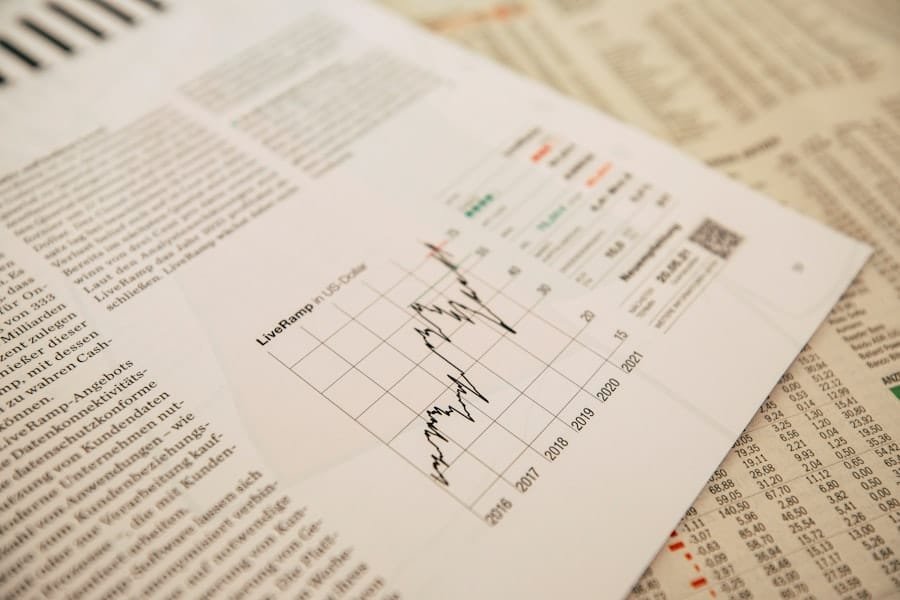The stock market plays a vital role in the global economy, acting as a gauge of economic health and a catalyst for economic growth. Stock market performance encompasses the fluctuations in stock prices and the overall valuation of publicly traded companies. Economic growth, in contrast, is defined as the expansion of production and consumption of goods and services within an economy.
The interplay between stock market performance and economic growth is intricate and multidimensional, with each factor exerting influence on the other through various mechanisms. Stock market performance can serve as an indicator of economic well-being, as rising stock prices often reflect increased confidence in the economy and can stimulate consumer spending and investment. Conversely, declining stock prices may lead to diminished consumer confidence and reduced spending, potentially impeding economic growth.
The relationship between stock market performance and economic growth is of paramount importance to investors, policymakers, and economists, as it provides valuable insights into the overall health and trajectory of an economy.
Key Takeaways
- Stock market performance and economic growth are closely related, but the relationship is complex and influenced by various factors.
- Historical perspectives show that stock market performance can both drive and be driven by economic growth, depending on the specific context.
- Factors such as interest rates, inflation, and government policies can significantly influence the relationship between stock market performance and economic growth.
- Methods for assessing this relationship include statistical analysis, economic modeling, and case studies of specific market conditions.
- Case studies and examples demonstrate how stock market performance can impact economic growth, and vice versa, in different countries and time periods.
Historical Perspectives on the Relationship Between Stock Market Performance and Economic Growth
Historical Examples of Interconnectedness
One of the most notable examples is the Great Depression of the 1930s, where a significant decline in stock prices led to a severe economic downturn, characterized by high unemployment and low consumer spending. In more recent history, the dot-com bubble of the late 1990s and early 2000s saw a rapid increase in stock prices driven by speculation in internet-related companies. When the bubble burst, it led to a significant decline in stock market performance, which had a ripple effect on the broader economy.
Lessons from History
These historical examples highlight the interconnectedness of stock market performance and economic growth, demonstrating how fluctuations in one can impact the other. By studying these historical perspectives, economists and policymakers can gain valuable insights into the relationship between stock market performance and economic growth.
Informing Economic Policy
By understanding the complex relationship between stock market performance and economic growth, policymakers can develop more effective strategies to promote economic stability and growth. This knowledge can inform policy decisions, helping to mitigate the impact of economic downturns and promote sustainable economic growth.
Factors Influencing the Relationship Between Stock Market Performance and Economic Growth

Several factors can influence the relationship between stock market performance and economic growth. One such factor is investor sentiment, which can drive stock prices and, in turn, impact economic growth. When investors are optimistic about the future prospects of an economy, they are more likely to invest in stocks, leading to higher stock prices and potentially stimulating economic growth through increased investment and consumer spending.
Another factor that can influence the relationship between stock market performance and economic growth is government policy. Fiscal and monetary policies implemented by governments and central banks can have a significant impact on stock market performance and economic growth. For example, lowering interest rates can make borrowing cheaper, leading to increased investment and consumer spending, which can stimulate economic growth and drive up stock prices.
Additionally, global events such as geopolitical tensions, natural disasters, or pandemics can also influence the relationship between stock market performance and economic growth. These events can create uncertainty in the markets, leading to fluctuations in stock prices and potentially impacting economic growth. By understanding these factors and their influence on the relationship between stock market performance and economic growth, investors and policymakers can make more informed decisions.
Methods for Assessing the Relationship Between Stock Market Performance and Economic Growth
There are several methods for assessing the relationship between stock market performance and economic growth. One common method is to analyze historical data to identify trends and correlations between stock market performance and economic indicators such as GDP growth, unemployment rates, and consumer spending. By examining historical data, economists can gain insights into how changes in stock market performance have impacted economic growth in the past.
Another method for assessing the relationship between stock market performance and economic growth is through econometric modeling. Econometric models use statistical techniques to analyze the relationship between variables such as stock prices and economic indicators. By using econometric modeling, economists can quantify the impact of stock market performance on economic growth and vice versa, providing valuable insights into the dynamics of this relationship.
Furthermore, qualitative research methods such as case studies and interviews with industry experts can also provide valuable insights into the relationship between stock market performance and economic growth. By combining these various methods, economists can gain a comprehensive understanding of the relationship between stock market performance and economic growth.
Case Studies and Examples of the Relationship Between Stock Market Performance and Economic Growth
There are numerous case studies and examples that illustrate the relationship between stock market performance and economic growth. One such example is the rapid economic growth experienced by China in recent decades, which has been accompanied by a significant increase in stock market performance. As China’s economy has grown, so too has its stock market, with rising stock prices reflecting investor confidence in the country’s future prospects.
Another example is the impact of the 2008 financial crisis on both stock market performance and economic growth. The crisis led to a significant decline in stock prices, which had a ripple effect on the broader economy, leading to a severe recession characterized by high unemployment and low consumer spending. These case studies highlight how changes in stock market performance can impact economic growth, providing valuable insights for investors and policymakers.
Implications of the Relationship Between Stock Market Performance and Economic Growth for Investors and Policymakers

Implications for Investors
For investors, grasping this relationship is crucial for making informed investment decisions. By analyzing how changes in stock market performance have historically impacted economic growth, investors can better assess their investment strategies and make more informed decisions about asset allocation.
Insights for Policymakers
For policymakers, the relationship between stock market performance and economic growth provides valuable insights into the broader health of an economy. By monitoring changes in stock prices and their potential impact on economic growth, policymakers can make more informed decisions about fiscal and monetary policies to stimulate economic growth or mitigate potential downturns.
Informing Economic Decision-Making
Ultimately, understanding the connection between stock market performance and economic growth enables both investors and policymakers to make more informed decisions. By recognizing the interplay between these two key indicators, they can develop more effective strategies to promote economic growth and stability.
Future Trends and Considerations for Understanding the Relationship Between Stock Market Performance and Economic Growth
Looking ahead, several future trends and considerations are important for understanding the relationship between stock market performance and economic growth. One such consideration is the increasing interconnectedness of global financial markets. As financial markets become more interconnected, changes in stock market performance in one country can have ripple effects on economies around the world, highlighting the need for a global perspective when analyzing this relationship.
Additionally, technological advancements such as algorithmic trading and high-frequency trading have the potential to impact stock market performance and its relationship with economic growth. These advancements can lead to increased volatility in stock prices, potentially impacting economic growth in unforeseen ways. In conclusion, the relationship between stock market performance and economic growth is complex and multifaceted, with numerous historical examples highlighting its significance.
By understanding the factors influencing this relationship, employing various methods for assessment, studying case studies, considering its implications for investors and policymakers, and taking future trends into account, economists can gain valuable insights into this critical relationship that shapes our global economy.
If you’re interested in learning more about the relationship between stock market performance and economic growth, you may want to check out this article on The Econosphere’s website: The Econosphere’s Terms of Service. This article provides valuable insights into the factors that influence stock market performance and how they are related to overall economic growth. It’s a great resource for anyone looking to deepen their understanding of this complex relationship.
FAQs
What is the relationship between stock market performance and economic growth?
The relationship between stock market performance and economic growth is complex and can vary depending on various factors. Generally, a strong stock market performance can be an indicator of a healthy and growing economy, as it reflects investor confidence and expectations of future corporate profits.
How does stock market performance affect economic growth?
A strong stock market performance can have a positive impact on economic growth by boosting consumer and business confidence, leading to increased spending and investment. It can also make it easier for companies to raise capital for expansion and innovation.
Can economic growth affect stock market performance?
Economic growth can influence stock market performance, as a growing economy can lead to higher corporate profits, which can in turn drive stock prices higher. However, other factors such as interest rates, inflation, and geopolitical events can also impact stock market performance.
What are the limitations of using stock market performance as a measure of economic growth?
While stock market performance can provide insights into the overall health of the economy, it is not the only indicator of economic growth. Other factors such as employment levels, consumer spending, and GDP growth should also be considered when assessing the state of the economy.
How do economists assess the relationship between stock market performance and economic growth?
Economists use various statistical and econometric methods to analyze the relationship between stock market performance and economic growth. They may look at historical data, conduct regression analyses, and consider other economic indicators to understand the dynamics between the two variables.








